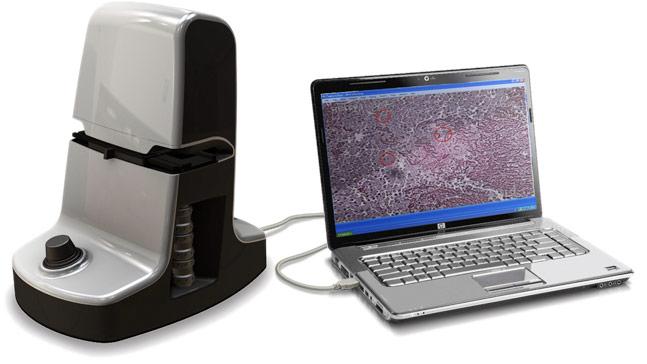Diascopic LLC secures NIH SBIR grant to bring to market their diagnostic platform that incorporates artificial intelligence for digital TB detection

Credit: Diascopic, LLC
Cleveland–Diascopic LLC, a Cleveland-based medical research company that develops diagnostic technology, will use a highly competitive federal grant to develop and apply new artificial intelligence (AI) and digital pathology tools for detecting tuberculosis (TB).
Company principals Cary Serif, chief executive officer, and Jim Uhlir, vice president of research and engineering, are focused on rapid, mobile, low-cost and accurate digital pathology solutions for pressing health problems.
According to the Word Health Organization, an estimated 1.8 billion people–that’s almost one quarter of the world’s population–are currently infected with the bacterium that causes TB. It is found in every country in the world, and is the leading infectious cause of death worldwide. In 2018, according to the TB Alliance, 10 million individuals fell ill from TB, and 1.6 million died.
In its effort to combat this global pandemic, Diascopic has conducted preliminary studies of its diagnostic technology in five African clinical locations where TB is prevalent. Preliminary results were promising enough to secure $225,000 in Small Business Innovation Research (SBIR) funding from the National Institute of Health’s National Institute for Biomedical Imaging and Bioengineering.
Serif and Anant Madabhushi, professor of biomedical engineering at Case Western Reserve University, are co-principal investigators on the grant.
Madabhushi, also director of the university’s Center for Computational Imaging and Personalized Diagnostics, brings his image-analysis expertise to augment the Diascopic platform by applying AI to help classify TB bacterium within the images.
Diascopic combines low-magnification, high-resolution imaging with digital-analysis software for a portable, simple and flexible digital diagnostic platform that allows for immediate inspection of microscopic specimens.
Unlike traditional methods for TB diagnosis–which require highly trained technicians, laboratory equipment and several hours to several days–Diascopic’s iON platform detects the TB bacterium digitally in less than 60 seconds from a single sample.
“By digitizing the process, we’re able to reuse the image in perpetuity, which makes the test highly repeatable,” said Serif. “Just as importantly, the digitization allows us to build a massive reference library to which we can apply artificial intelligence and data analytics to continue improving the test’s accuracy.”
Health care specialists need a faster, more reliable disease detection process that functions as well in the lab as it does for mobile applications. In addition, a new level of automation can provide economic operating efficiencies.
Diascopic is working with the Uganda Case Research Collaboration (UCRC), a collaborator on the SBIR grant, to collect 400 specimens, from which Diascopic will generate roughly 60,000 digital images.
The highly competitive federal SBIR program encourages domestic small businesses to engage in research and development with potential for commercialization.
From 2011 through 2014, Uhlir and Serif performed studies in four clinics across South Africa, Namibia and Uganda to train the software platform. From those studies, the accuracy rate for detection rose from 75% to 95%.
“The intention,” Uhlir said, “is to raise the bar, compared to other diagnostic tests, to reduce the cost and technical skill needed to administer the test, while also increasing the speed of diagnosis.”
###
About Diascopic LLC
Diascopic LLC is a Cleveland-based medical diagnostic research company. Since 2009, Diascopic has been focused on developing a robust platform capable of using the power and intricacies of digital analysis to define, recognize and identify significant pathogens. The company seeks to reduce the cost and technical skill of diagnostic tests while increasing the speed and accuracy of diagnosis, in order to allow for near point-of-care results in high-burden, low-resource environments. Visit diascopic.com to learn more.
Media Contact
Christine Coolick
[email protected]
216-789-0342




